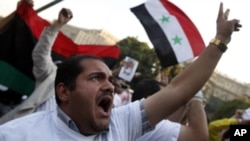Arab diplomats asked the Syrian government on Sunday to open a dialogue with anti-government protesters. A Syrian "national dialogue" is set to be held at Arab League headquarters in two weeks, but commitment from Damascus for the planned talks is unclear.
The emergency Arab League meeting fell short of its original aim - suspending Syria from the regional group for the government's violent crackdown on civilian opponents.
But the Foreign Minister of Qatar, one of the six Persian Gulf nations to call for the meeting, said Arab states will be taking an initiative, and are calling on the Syrian government to hold talks with the opposition.
Sheikh Hamad bin Jassim al-Thani said he wants the discussions to take place in 15 days, at Arab League headquarters in Cairo. He added that he hopes Damascus will respond to the call for a dialogue and begin to respond to the demands of the Syrian people.
Syria's Ambassador to the Arab League. Yousef Ahmad, said his country's government will respond positively and openly to "sincere and effective" Arab efforts to end the crisis.
Ahmad added that the Syrian government would propose an initiative to reinforce democracy, reform and human rights. It was the most sweeping pledge by a Syrian official during more than seven months of anti-government demonstrations. The government has yet to implement the changes.
Anti-Syrian demonstrators gathered outside Arab League headquarters in hopes that the group will move against Damsacus. Most of the League's Persian Gulf members have already restricted diplomatic ties with Syria, recalling their ambassadors over the violence that the United Nations estimates has claimed more than 3,000 lives.
But those members failed to rally the necessary two-thirds majority needed to suspend Syria from the organization. The governments of other League nations facing uprisings, including Yemen, reportedly are among those resisting the suspension.
Such action is not often taken by the group. But earlier this year, the League suspended Libya for then-leader Moammar Gadhafi's crackdown on his opponents. The move was considered a sign that foreign intervention, in the form of NATO military action, would find regional acceptance.
But discussions of an international military campaign in Syria have been far more muted, while the success of even more limited pressure is questioned by some analysts.
Egyptian political analyst and publisher, Hisham Kassem, says Syria's government will not consider foreign advice. "It's very difficult to see what anybody regionally could do, aside from a military intervention, which I don't think is going to happen. So no political pressures will make a difference in the situation. What you have out there is a president and a regime who know that they either massacre their population and stay in power or they are possibly going to be massacred themselves," he said.
As for the Arab League, long criticized for not backing up its declarations with action, it has yet to say what it will do if Syria's government fails to take part in the proposed national dialogue.
Arab League Keeps Syria as Member




